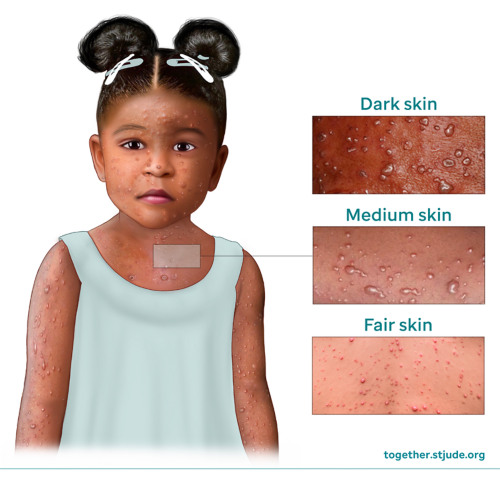Menu
Close
Back
Welcome to
Together is a new resource for anyone affected by pediatric cancer - patients and their parents, family members, and friends.
Learn MoreChickenpox is a disease that passes easily from person to person. It is caused by the varicella virus.
Chickenpox can cause fever, low appetite, and tiredness followed by an itchy rash. It is contagious from 1–2 days before the rash appears until the rash has dried up.
It can cause serious illness in a child who is immunocompromised (has a weak immune system). Sometimes chickenpox infects organs such as the brain, lungs, or liver.

The chickenpox rash shows up 10–21 days after the child is exposed to the virus. The rash usually appears first on the face and upper body. The rash spreads across the whole body, including the scalp, groin, and inside the mouth, nose, and ears.
The rash begins as pink dots with small blisters on top. After about 24 hours, fluid in the blisters gets cloudy. Then the blisters begin to break open and crust over.
Chickenpox blisters show up in waves. After some spots break, new spots may appear. Blisters usually stop coming by the third day. By the sixth day, all blisters should scab and start to heal. In a child with a weak immune system, the rash is often more severe and lasts longer than 3–6 days.
The illness cannot pass to others after the blisters fully dry and heal. Children do not usually get chickenpox again. But the virus stays in the body.
Shingles is another illness caused by the varicella virus. A child who had chickenpox may later get shingles. Shingles is more common in adults. But anyone who has had chickenpox can get it. Shingles is more common in people with immune systems weakened by:
The vaccine for chickenpox is the varicella vaccine. It is recommended for all children in the U.S. The vaccine contains a weakened form of the virus that protects against the natural virus.
Children who get the vaccine rarely develop chickenpox even if their immune systems are weak. Because the vaccine also stays in the body, people who get the vaccine also can get shingles later in life. But this is rare. There is a shingles vaccine for older adults.
Children with weak immune systems should not get the varicella vaccine because it contains weakened live virus. But siblings of these children should get the vaccine to help protect their sibling.
Being around someone with chickenpox or shingles is a danger to a child with a weak immune system who has never had chickenpox or the vaccine. Tell other people about the danger of chickenpox to your child. These people include:
Tell your child's care team right away if your child is exposed to chickenpox. Your child’s doctor might suggest medicine or another treatment. Children exposed to chickenpox must avoid other immunocompromised children for several weeks. This will reduce the chance of giving the virus to another child.
Children with weak immune systems are at higher risk of infection. Call a member of your care team right away if your child:
Your care team can help you decide if there is cause for concern. They will also check your child’s condition to decide if your child can be near other patients.
If you have questions about chickenpox or your child’s risk, please talk to your doctor or nurse.
For more information, visit the Centers for Disease Control and Prevention website about chickenpox.
—
Reviewed: July 2022